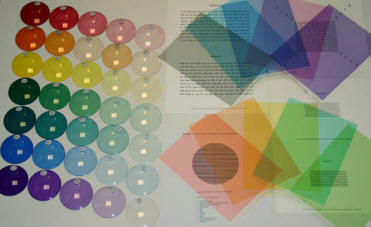What is Irlen Syndrome?
Irlen Syndrome is a little known problem affecting the way the brain processes images from the retina, but is also far more wide-spread than you would believe considering most people have never even heard of it! So why should something I describe as being wide-spread, be so little known?
Well first of all, let me give you a very crude description of what this syndrome actually is, and crucially what it is not. It is important to state that this syndrome is neither an optical nor a medical problem, so it's no good asking a doctor or an optician if you've got it! It is a brain processing problem caused by the sufferer's inability to process a particular wavelength of light.
Each wavelength consists of a particular colour of the spectrum, and it is that wavelength, containing the colour that the Irlen brain cannot process, that causes the problem. Because what we see is made up of colours that form the dimensions, shape and position of the print or the object being viewed, any colour of the spectrum that is not processed by the brain will affect the results of what the sufferer sees. The object may be larger, smaller, moving, stationary, in a different position to the reality or even not there at all!
Irlen Syndrome, also known as Scotopic Sensitivity Syndrome (SSS) is a type of visual perceptual problem. It is not an optical problem. It is a problem with how the nervous system encodes and decodes visual information. Academic and work performance, behaviour, attention, ability to sit still and concentration can be affected. Individuals with this problem see the printed page differently, although they may not realise that they do. Having Irlen Syndrome keeps many people from reading effectively, efficiently, or even at all.
Relevance with driving
Practically everything you will read about the symptoms of Irlen Syndrome relate to reading problems. But try changing the word 'reading' into 'driving' and you will see how those with reading difficulties may well diplay the same symptoms when driving:
- Problems with glare, sunlight and/or night driving
- Print that shifts, shakes, moves, doubles, disappears and is difficult to perceive. (Learners who have difficulty keeping correct positioning - moving closer then further away from the kerb/edge of road)
- Inability to read several words as a group (feeling overwhelmed in traffic situations; inability to read the traffic)
- Difficulty in concentrating when reading (losing concentraion when driving)
- May take frequent breaks, look away, become restless, fidgety or tired (you may be able to identify learners like this now)
- Clumsy and may have difficulty catching balls (demonstrates inability to accurately see the position of objects)
- Inability to judge distances accurately, especially when driving. (My first ever learner to be diagnosed with Irlen Syndrome discovered during the testing that words actually have spaces between them and spaces between the lines!!)
- Uncertain when using escalators, stairs or revolving doors (because things are moving anyway. Imagine this combination when driving!)
-
Stress and fatigue:
- Headache, especially when undertaking visual tasks (develops headaches every lesson)
- Fatigue at the end of the day (is always excessively tired by end of lesson, more so than most of your learners)
- Performance deteriorates over time (their progress tails off and you feel like you're getting nowhere!)
Any of these symptoms in isolation are not an indication of Irlen Syndrome, but having a high number of these factors certainly may well point to Irlen Syndrome. You will find much more information on the main Irlen website. There are also now Irlen centres in the UK so you may find a test centre near you. If there is no centre nearby, contact the nearest who may then be able to put you in touch with a certified screener nearer to you who can administer an initial test.to determine whether or not a further diagnostic test for Irlen filters may be of benefit to the individual.
Is there a cure?
There is no 'cure' for Irlen Syndrome, but there certainly is a solution and that is in using coloured lens filters, worn either as glasses or contact lenses. The coloured filter can also be added to prescription lenses. It is important to note that the person wearing coloured lenses does not see the world tinged in that colour. The filter lenses merely filter out the colour of the spectrum that causes the problem for the individual. I remember when I first saw Tom Cruise wearing coloured lenses in his glasses when he was indoors and thinking he was a poser! I now know better because he also suffers from dyslexia so is therefore one of the 33%.
In case you're wondering, Irlen Syndrome is so named after the American psychologist who developed this method, Helen Irlen. Around the same time similar research was being carried out by a teacher in New Zealand, Olive Meares, so you will also see this syndrome referred to as Meares-Irlen Syndrome or, more scientifically, by the term 'Scotopic Sensitivity'. More info here.
And finally,the following quote, from the previous link, has got me thinking as to whether the conditions known as ADD and ADHD actually exist. Could they not be terms given to children suffering from the symptoms of Irlen Syndrome??
Irlen Syndrome, also known as, Scotopic Sensitivity Syndrome (SSS) is a type of visual perceptual problem. It is not an optical problem. It is a problem with how the nervous system encodes and decodes visual information. Academic and work performance, behaviour, attention, ability to sit still and concentration can be affected. Individuals with this problem see the printed page differently, although they may not realize that they do. Having Irlen Syndrome keeps many people from reading effectively, efficiently, or even at all.
Food for thought?

